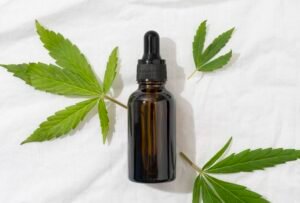Bipolar disorder, a complex mental health condition impacting millions globally, poses the formidable challenge of managing alternating periods of manic and depressive episodes. In the ongoing quest for effective treatments, an intriguing avenue explored by some individuals is the use of marijuana for bipolar disorder, colloquially known as cannabis. This alternative approach to managing the condition raises a critical question: Is it safe to consider marijuana for depression and bipolar disorder? In this article, we delve into the potential of treating bipolar disorder with marijuana, examining its safety and efficacy as a therapeutic option for those navigating the intricate landscape of this mental health challenge.
Also Read: Best Hemp Products
Understanding Bipolar Disorder
Exploring the potential benefits of marijuana for depression and bipolar disorder requires a comprehensive understanding of the nature of Bipolar Disorder. This complex condition is marked by discernible mood swings, encompassing manic highs and depressive lows, creating a unique and personalized experience for each individual. The severity and duration of these mood episodes vary, contributing to the intricate nature of Bipolar Disorder. As researchers delve into alternative treatments, including the utilization of marijuana, it becomes imperative to consider how this natural substance may play a role in alleviating the symptoms associated with depression and bipolar disorder.
The Controversy Surrounding Marijuana Use
The exploration of marijuana for bipolar disorder has garnered considerable interest in recent times. The utilization of marijuana in addressing mental health issues, particularly bipolar disorder, is a subject marked by substantial controversy. Despite some anecdotal accounts proposing that marijuana may potentially alleviate specific symptoms associated with bipolar disorder, the discourse surrounding its employment is characterized by significant apprehensions regarding both safety and efficacy. As individuals increasingly seek alternative approaches for managing bipolar disorder, the examination of marijuana’s potential impact on this condition continues to be a topic of debate within the medical community and beyond.
Also Read: CBD for Arthritis Pain
Potential Benefits of Marijuana for Bipolar Disorder
Mood Stabilization
There is a growing body of support for the idea that certain constituents found within marijuana may possess mood-stabilizing attributes. Advocates of this perspective suggest that marijuana for depression and bipolar disorder could be a potential avenue worth exploring. They contend that these compounds might play a role in harmonizing the often tumultuous mood fluctuations linked to bipolar disorder, potentially providing a source of solace during periods of deep depression or intense manic states. This notion of marijuana as a mood-balancing agent for individuals grappling with bipolar disorder is an area of increasing interest and research, as it holds promise for those seeking alternative approaches to managing their condition while warranting further investigation and clinical exploration.
Anxiety and Sleep
Marijuana, renowned for its soothing properties, holds the potential to offer relief to those grappling with bipolar disorder by assisting in anxiety management and enhancing the quality of sleep, particularly in times marked by elevated stress levels or during manic episodes. The utilization of marijuana for depression and bipolar disorder has been a subject of growing interest, with an increasing number of individuals exploring its potential therapeutic benefits. The calming influence of marijuana is believed to play a role in stabilizing mood fluctuations, offering a potential avenue for those seeking alternative approaches to managing the challenges associated with bipolar disorder. As research progresses, the exploration of marijuana for depression and bipolar disorder continues to evolve, shedding light on its potential as a complementary option in the realm of mental health interventions.
Also Read: Marijuana facts
Risks and Concerns
While there are potential benefits associated with marijuana use for bipolar disorder, it’s crucial to consider the risks and concerns:
Mood Swings
The utilization of marijuana, a substance with varied effects on mood, introduces an element of unpredictability that may potentially escalate symptoms associated with bipolar disorder. It is crucial to recognize that what proves beneficial for one individual may not necessarily yield the same positive outcomes for another, thereby giving rise to the possibility of adverse consequences. Exploring the role of marijuana for depression and bipolar disorder requires a nuanced understanding of its impact, acknowledging the diverse responses that individuals may manifest. It underscores the importance of personalized approaches in addressing mental health concerns, emphasizing the need for comprehensive assessments to determine the appropriateness of marijuana as a potential intervention for managing symptoms associated with depression and bipolar disorder.
Cognitive Impairment
Cannabis, often referred to as marijuana, has been a topic of significant debate in the medical community, especially when considering its potential effects on mental health. While some studies suggest potential benefits of marijuana for depression and bipolar disorder, it’s essential to approach this topic with caution. Marijuana can sometimes impair cognitive function, a concern that becomes even more pronounced for individuals who are already grappling with cognitive challenges during their mood episodes. For those with conditions like depression or bipolar disorder, it’s crucial to weigh the potential therapeutic benefits against the risks. As research continues, it’s hoped that clearer guidelines on the use of marijuana for depression and bipolar disorder will emerge, helping patients make informed decisions about their treatment options.
Interaction with Medications
Many individuals diagnosed with bipolar disorder are often given mood-stabilizing medications as a primary treatment option. The relationship and interaction between these prescribed drugs and the use of marijuana for depression and bipolar disorder remain a topic of ongoing research and discussion. The comprehensive effects of combining these mood stabilizers with marijuana are not entirely clear, and the outcomes might differ based on the specific medication in question. Given this ambiguity, it’s crucial for patients and healthcare professionals to approach the subject with caution, as the unpredictability can introduce potential risks to those seeking relief from their symptoms.
Also Read: Marinol and Marijuana
Bipolar Disorder Variability
Bipolar disorder is a complex mental health condition, and its manifestation can differ significantly from one individual to another. Given this variability, it’s crucial to understand that treatment approaches should be tailored to each person’s unique needs and circumstances. Among the myriad of potential treatments, the use of “marijuana for depression and bipolar disorder” has garnered attention in recent years. While some individuals have reported benefits from its use, it’s essential to approach this option with caution. The effects of marijuana on bipolar symptoms can be unpredictable, and what may offer relief to one person might exacerbate symptoms in another. As with any treatment, it’s imperative to consult with healthcare professionals and consider all potential risks and benefits before incorporating marijuana as a therapeutic intervention for depression and bipolar disorder.
The Importance of Medical Guidance
When contemplating the use of marijuana for depression and bipolar disorder, it becomes imperative to seek the expertise of a seasoned mental health professional. Such experts can offer tailored advice that aligns with your unique circumstances. They can delve deep into understanding the intricate balance between the potential advantages and the associated risks of using marijuana in such contexts. Furthermore, they can shed light on a plethora of alternative treatment avenues that might be more suited to your needs. It’s essential to remember that while marijuana might offer relief to some, its effects can vary, making professional guidance indispensable.
Also Read: Marijuana and Schizophrenia
Alternatives to Marijuana Treatment
In the realm of mental health treatments, particularly for conditions like bipolar disorder, there exists a plethora of options that individuals can explore. Among these, psychotherapy, cognitive-behavioral therapy, and an array of medications stand out as some of the most recommended and traditionally employed methods. These treatments, backed by extensive research and clinical trials, have a more established track record in effectively managing the symptoms and episodes associated with bipolar disorder. Moreover, they are often perceived as safer for prolonged use. However, in recent times, there has been growing interest and debate surrounding the potential benefits and risks of using marijuana for depression and bipolar disorder. While some anecdotal evidence suggests potential therapeutic effects, comprehensive studies are still needed to determine its efficacy and safety in comparison to more conventional treatments.
Personalized Approaches to Bipolar Disorder
Each individual with bipolar disorder requires a personalized treatment plan. What works best may differ from one person to another. Consulting with a healthcare provider can help tailor a strategy that addresses specific needs and concerns.
Conclusion
The utilization of marijuana for depression and bipolar disorder has garnered significant attention in recent years, leading to a myriad of discussions and debates within the medical community. While some individuals advocate for its potential therapeutic benefits, the topic remains intricate and laden with controversy. There are undeniable safety concerns associated with its use, especially when considering the possibility of exacerbated mood swings and potential cognitive impairments. Furthermore, the effects of marijuana on individuals with bipolar disorder can vary, making it imperative to approach the subject with caution. Given the complexities surrounding this issue, it is of paramount importance for anyone considering marijuana as a treatment option to prioritize their safety. Engaging in informed discussions and seeking guidance from a qualified healthcare professional is essential to ensure the best possible outcomes for those exploring the potential benefits and risks of using marijuana for depression and bipolar disorder.
FAQs
Q. Can marijuana cure bipolar disorder?
A. No, marijuana cannot cure bipolar disorder. It may provide temporary symptom relief but does not address the underlying causes of the condition.
Q. Is it legal to use marijuana for bipolar disorder treatment?
A. The legality of using marijuana for medical purposes varies by region. It is essential to research and follow local laws and regulations.
Q. What strains of marijuana are considered safer for bipolar patients?
A. There is no one-size-fits-all answer to this question. The suitability of a specific strain depends on individual factors and should be discussed with a healthcare provider.
Q. How can I find a qualified healthcare professional for guidance?
A. You can start by seeking referrals from your primary care physician or mental health clinic. Ensure that the professional has experience in treating bipolar disorder.
Q. Are there any natural remedies for bipolar disorder?
A. While some natural remedies, such as maintaining a stable routine and a healthy lifestyle, can complement traditional treatments, they should not be used as a sole treatment for bipolar disorder.








